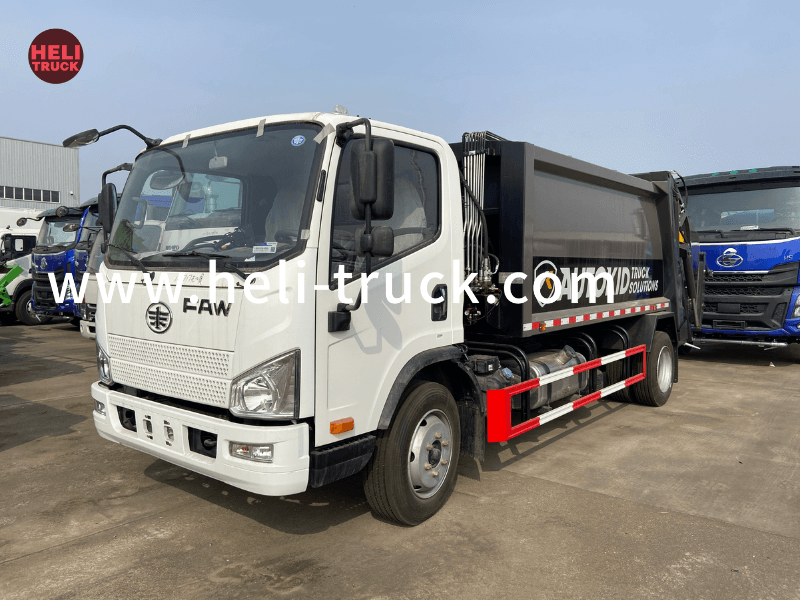Innovations in Waste Management The Evolution of Garbage Compactor Trucks with Advanced Hydraulics
Introduction
Waste management is a critical aspect of urban living, and garbage compactor trucks play a vital role in collecting and disposing of waste efficiently. Over the years, advancements in technology have led to the development of garbage compactor trucks with advanced hydraulics, revolutionizing the waste management industry. In this article, we will explore the evolution of garbage compactor trucks, the role of hydraulics in their operation, and the benefits of these advanced systems.
Evolution of Garbage Compactor Trucks
Garbage compactor trucks have come a long way since their inception in the early 20th century. The first garbage trucks were simple open-bed vehicles that required manual labor to load and unload waste. As cities grew and populations increased, the need for more efficient waste collection systems became evident.
In the 1930s, the first compactor-type garbage trucks were introduced, which featured a hydraulic compactor that could compress waste to maximize the truck's capacity. This innovation significantly improved the efficiency of waste collection and reduced the number of trips required to transport garbage to disposal sites.
Over the decades, garbage compactor trucks have undergone numerous improvements and innovations to enhance their performance and reliability. One of the most significant advancements in recent years has been the integration of advanced hydraulic systems into these vehicles.
Role of Hydraulics in Garbage Compactor Trucks
Hydraulics play a crucial role in the operation of garbage compactor trucks, enabling them to perform various functions efficiently. Hydraulic systems use fluid pressure to generate power and control the movement of components within the truck. In the case of garbage compactors, hydraulics are responsible for powering the compaction mechanism and other essential functions.
The hydraulic system in a garbage compactor truck typically consists of a hydraulic pump, hydraulic cylinders, control valves, and a hydraulic reservoir. When the compactor is activated, the hydraulic pump pressurizes the hydraulic fluid, which then flows to the hydraulic cylinders. The cylinders extend or retract based on the direction of the fluid flow, allowing the compaction blade to compress the waste inside the truck's body.
Advanced Hydraulics in Garbage Compactor Trucks
In recent years, advancements in hydraulic technology have led to the development of garbage compactor trucks with advanced hydraulic systems. These systems incorporate innovative features and technologies that improve the performance, efficiency, and safety of waste collection processes.
garbage truck manufacturers of the key advancements in advanced hydraulic systems for garbage compactor trucks is the integration of electronic controls and sensors. These sensors monitor various parameters, such as pressure, temperature, and position, allowing for precise control and adjustment of the hydraulic system. Electronic controls also enable automated operation of the compactor, reducing the need for manual intervention.
Another innovation in advanced hydraulic systems is the use of variable displacement pumps. These pumps adjust the flow of hydraulic fluid based on the load and operating conditions, optimizing energy efficiency and reducing fuel consumption. Variable displacement pumps also contribute to smoother operation and lower maintenance requirements for garbage compactor trucks.
Benefits of Advanced Hydraulic Systems in Garbage Compactor Trucks
The integration of advanced hydraulic systems in garbage compactor trucks offers several benefits for waste management operations and the environment. Some of the key advantages of these systems include:
1. Increased Efficiency: Advanced hydraulic systems enable garbage compactor trucks to operate more efficiently, reducing collection times and increasing the amount of waste that can be transported in each trip. This leads to cost savings for waste management companies and improved service for residents.
2. Enhanced Safety: The use of electronic controls and sensors in advanced hydraulic systems enhances the safety of garbage compactor truck operations. These systems can detect and prevent potential malfunctions, reducing the risk of accidents and injuries to operators and bystanders.

3. Environmental Sustainability: By optimizing energy efficiency and reducing fuel consumption, advanced hydraulic systems help minimize the environmental impact of waste collection activities. Lower fuel consumption also results in reduced emissions, contributing to cleaner air and a healthier environment.
4. Improved Reliability: Advanced hydraulic systems are designed to be more robust and reliable than traditional hydraulic systems, reducing downtime and maintenance costs for garbage compactor trucks. This ensures consistent performance and longevity of the vehicles, ultimately benefiting waste management operations.
Conclusion
Garbage compactor trucks with advanced hydraulic systems represent a significant evolution in waste management technology, offering enhanced efficiency, safety, and sustainability benefits. The integration of electronic controls, sensors, and variable displacement pumps has revolutionized the operation of these vehicles, making them essential tools for modern waste collection processes.
As cities continue to grow and urban populations increase, the demand for effective waste management solutions will only continue to rise. Garbage compactor trucks with advanced hydraulics are well-positioned to meet these challenges, providing a reliable and sustainable means of collecting and disposing of waste in urban environments. By leveraging the latest advancements in hydraulic technology, waste management companies can optimize their operations, reduce costs, and contribute to a cleaner and healthier planet.